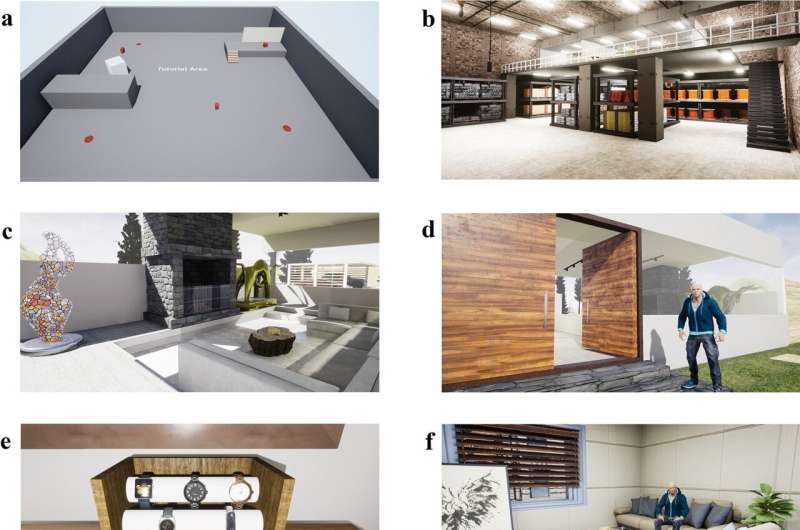This article has been reviewed according to Science X's editorial process and policies. Editors have highlighted the following attributes while ensuring the content's credibility:
fact-checked
peer-reviewed publication
trusted source
proofread
Using virtual reality to get inside the criminal mind

Psychologists from Edith Cowan University (ECU) have used virtual reality (VR) technology in a new study that aims to better understand criminals and how they respond when questioned. The results are published in the journal Scientific Reports.
"You will often hear police say, to catch a criminal, you have to think like a criminal—well that is effectively what we are trying to do here," said Dr. Shane Rogers, who led the project alongside ECU Ph.D. candidate Isabella Branson.
The forensic psychology research project involved 101 participants, who role-played committing a burglary in two similar virtual mock-crime scenarios.
"Afterwards, I interviewed them about the experience in a mock police interview," ECU Ph.D. researcher Isabella Branson said.
"The interview takes place in a virtual interrogation room, and I ask the questions in real time, with real responses."
A forensic deep dive
Dr. Shane Rogers said the study has the potential to unlock new insights into the criminal mind, and why they make the decisions they do.
"We know that historically criminals aren't forthcoming and often lie when questioned by the authorities," he explained.
"By putting non-criminals in criminal scenarios, we are given credible insight into how and why decisions are made in illegal scenarios or situations. This is why using mock crime scenarios is an invaluable method within forensic psychology research."
Traditionally, researchers have had people act out crimes on the university campus.
"Using virtual reality, we can have people engage in experiences that more faithfully recreate a criminal experience to obtain more reliable and valid findings."
"In our study we found that participants were able to get into the role of acting as a criminal in virtual reality. We also found that a higher level of motivation for conducting the crime also had them feeling more motivated to try and be deceptive in the follow up interview," Dr. Rogers said.
Virtual reality: A role in law enforcement
Dr. Shane Rogers said VR has a future in training police, more specifically detectives for interviews, where interview practice can be conducted in a wide range of virtual scenarios.
"Going a step further, potentially we could also see a future where offenders are questioned in a virtual reality environment. Somewhere that is dissimilar to the usual physical location, like an interview room or a prison cell—it could be somewhere less intimidating where they can feel more comfortable to respond more truthfully when interrogated," Dr. Rogers said.
Beyond the law
The development of virtual reality mock crime experiences has applications beyond interviewing.
"These scenarios can also be used to study how everyday people, and criminal offenders, go about conducting crimes. What points of entry are preferred? What kinds of things provide the most deterrent?" Dr. Rogers explained.
"Police officers could role-play as criminals in these virtual scenarios themselves, to put themselves in the shoes of a criminal to better understand how they think and act."
More information: Isabella S. Branson et al, Intrinsic motivation in a virtual reality mock crime affects participants' willingness to invest more effort in deceptive interviews, Scientific Reports (2024). DOI: 10.1038/s41598-023-50515-4
Journal information: Scientific Reports
Provided by Edith Cowan University




















